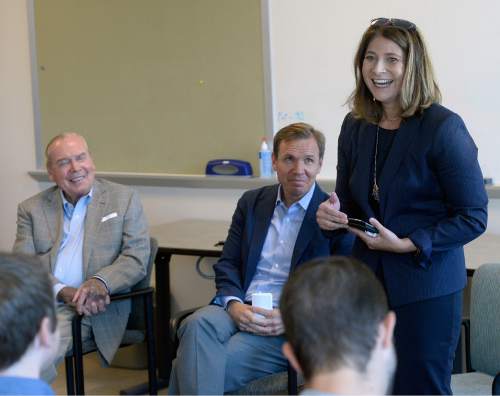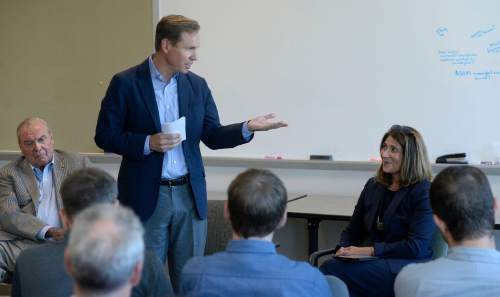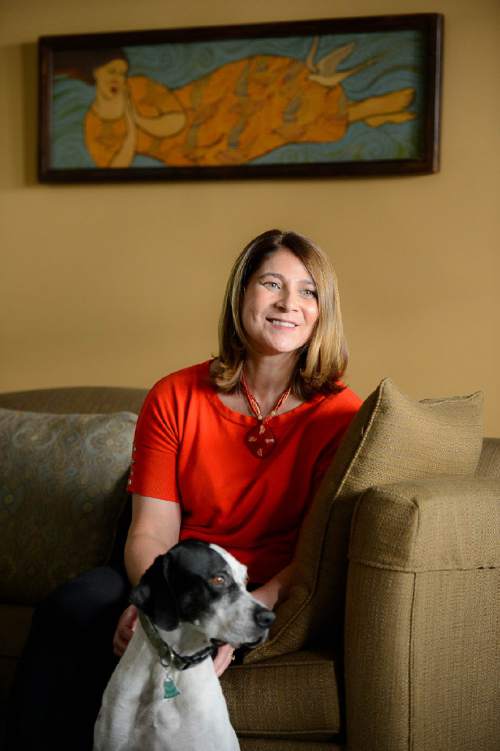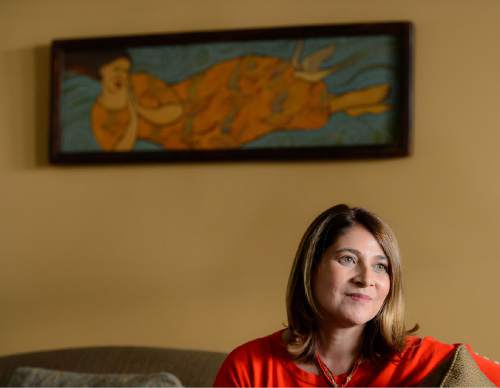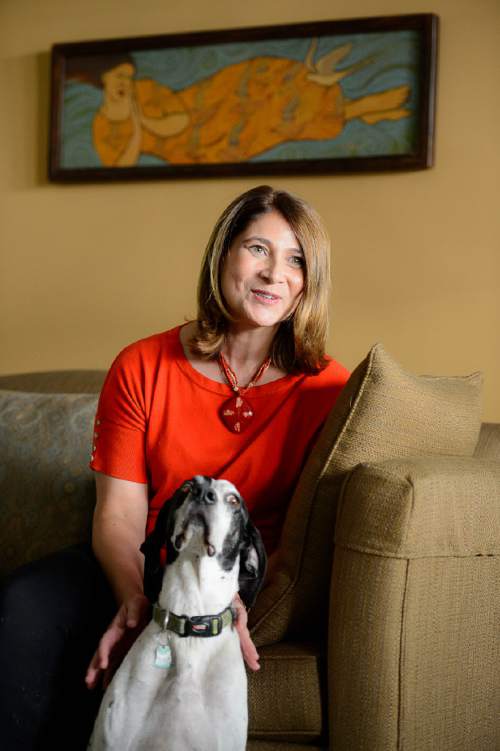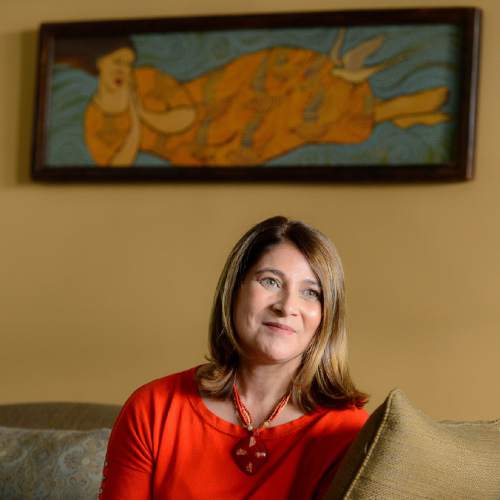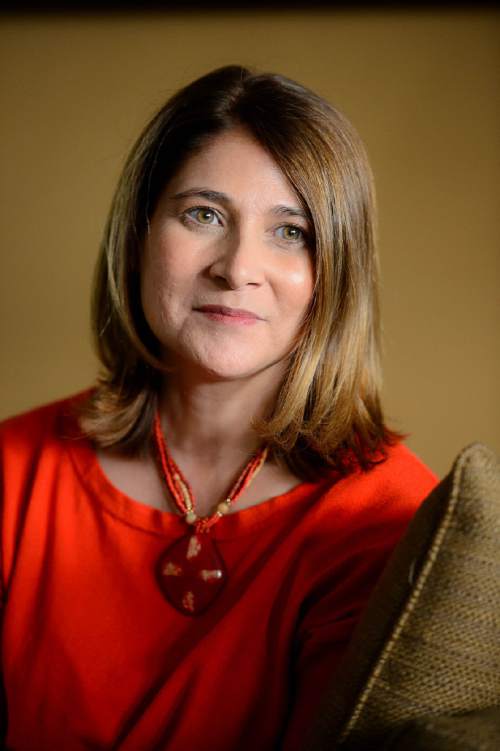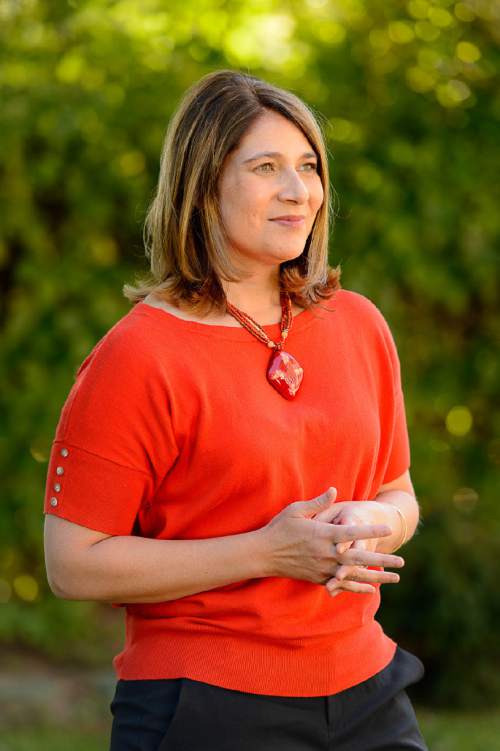This is an archived article that was published on sltrib.com in 2016, and information in the article may be outdated. It is provided only for personal research purposes and may not be reprinted.
As a newsy Tuesday arrived recently at The Salt Lake Tribune, its new editor was already at work, more than a week earlier than planned.
Digested newspapers lay mangled and strewn across a nearby table. Pastel flowers on her desk — a bouquet from newsroom staffers — lent color to the spacious corner office. Jennifer Napier-Pearce combed through emails in a brief calm before the day's parade of breathless updates and meetings began.
Amiable, studious and detail-oriented, she's known for an incisive interviewing style and a love of storytelling. Friends say she is smart, collaborative and fun to be around. She's a mother of two teens and married to a Utah Supreme Court justice. She sings, plays piano and grooves on hip-hop and new wave. She plays a mean game of cards and unwinds by tackling word puzzles or romping with the family dog, Sydney.
And from her low-key, straight-ahead manner on the job, you might not know the 47-year-old veteran journalist and public-radio personality is making history on several fronts.
Napier-Pearce is the first person officially hired by The Tribune's new owner, Utah businessman Paul Huntsman, who bought the newspaper in May and hopes to steer it toward a more financially stable, digitally focused future.
She is the first active Latter-day Saint to hold the Salt Lake City daily's top newsroom post since the paper was founded 145 years ago — by virulently anti-Mormon owners.
She is the first ethnic minority — and second woman — to head The Tribune. The California native, who moved to Magna at age 4, is half Tongan on her father's side.
Notwithstanding these milestones, Napier-Pearce prefers to stay out of the spotlight.
"I hate being the news," she wrote to a Tribune reporter, shortly after Huntsman announced her hiring in July. "I really don't think I'm very interesting."
—
Back to the future • With degrees from the University of Utah and Stanford, Napier-Pearce has been an award-winning journalist for 20 years, with stints as reporter, anchor and news director at public-radio stations KUER 90.1 FM and KCPW 88.3 FM before joining The Tribune in 2013.
She caught Huntsman's interest, partly through her hosting of Trib Talk, the paper's online video chat. She was finishing up a 2½-year stint as a Tribune multimedia reporter and headed to a new job at the U.'s Hinckley Institute of Politics when Huntsman emailed her, asking to pick her brain about the paper's direction.
He'd been impressed, he said, by the range and caliber of guests Napier-Pearce showcased on Trib Talk each day, from Mormon apostles and top Utah politicians to the state's LGBT leaders.
After a face-to-face meeting at Huntsman Corp.'s Salt Lake City headquarters — alongside Huntsman's father, chemicals magnate and philanthropist Jon Huntsman Sr. — they offered her the editor job. Several conversations later, she accepted.
Napier-Pearce said she "couldn't be happier," but that "the shock still hasn't worn off." Ultimately, she said, her decision to return to Utah's largest daily so soon after taking another post came down to one motivation:
"What I care about is media and the future of media," Napier-Pearce said. "This is a pivotal time, and we can take this paper even further into a successful future.
"There is room to grow now," she said of the new Tribune ownership, "and I wanted to be a part of it."
She replaces Terry Orme, a 40-year Tribune veteran who rose from newsroom clerk to become editor in 2013, when his predecessor, Nancy Conway, retired amid massive newsroom layoffs.
Though Huntsman offered Orme a "significant journalistic role" at the newspaper with Napier-Pearce at the helm, the beloved editor declined and left the paper July 29 — hours before her appointment was announced.
"Publishers need to install top management they trust will take the newsroom to new heights," Orme wrote in a departing note to employees. "I respect and accept that."
While sadness persists in the newsroom over Orme's exit, Napier-Pearce generally has been received as a familiar, friendly face by The Tribune's 85 reporters, editors and photographers.
In an interview, Paul Huntsman said he was especially compelled by Napier-Pearce's energy, communication skills and unabashed passion for journalism. Those traits won out, he said, over her lack of experience managing a large organization.
"We all have to start somewhere," said the 46-year-old publisher, who runs the Huntsman family's $1.1 billion private-equity investment fund.
"I really wanted someone who was excited to take on the role and the opportunities," he said, "but someone who understood the challenges as well."
—
The Mormon question • The Tribune was losing money when Huntsman bought it from the New York-based newspaper chain Digital First Media after years of fitful and complex negotiations. He told staffers he hopes to return the daily to profitability over the long term and has pledged to back Napier-Pearce with added resources.
"Not an open check," he noted, "but investing where it makes sense."
For her part, Napier-Pearce said she has a mandate to improve The Tribune, push it into new digital formats sought by news consumers and to strengthen its role as an aggressive check on powerful Utah institutions.
The Huntsmans, she said, "want a strong, viable newspaper. They understand the role and place The Tribune has in this community. They want that to be as robust as possible."
She and Huntsman turned aside concerns voiced by some readers about both being devout members of The Church of Jesus Christ of Latter-day Saints, given The Tribune's historical role as a watchdog on Utah's predominant faith and the clout it carries in the state.
Napier-Pearce said that while she understood the suspicions, she "had no intention of changing" The Tribune's part in reporting on the Mormon church and other centers of power.
"If anything," she said, "I'd be more aggressive."
Napier-Pearce said she hopes to be "judged on 20 years in journalism rather than my personal spiritual beliefs or my age or ethnic status."
Huntsman has vowed repeatedly to keep The Tribune independent. He said he believes most Utahns, particularly younger ones, do not necessarily view issues through a Mormon-vs.-non-Mormon lens.
"At some point," Huntsman said, "we need to move beyond that and look at the quality of the newspaper and at each other as individuals."
—
'Redheaded stepchild' • Reared in Magna, Napier-Pearce was known as Alisi Pahulu in elementary school before changing her name to Jennifer Napier. While attending Cyprus High, she remembers hand-me-downs arriving from the more-affluent Cottonwood High across the valley.
"Anybody who grew up in Magna in those days," Napier-Pearce said, "felt like the redheaded stepchild."
Her spouse and former Cyprus classmate, now state Supreme Court Justice John Pearce, jokingly retorted: "On behalf of redheads everywhere, I'm offended."
Napier-Pearce said her upbringing as a west-sider and her Pacific Islander heritage have given her a sense that "there are a lot of voices in Utah that we do not hear — and those should be amplified."
"That," she added, "is a priority."
She wrote for the high school paper and had a column in the now-defunct Green Sheet weekly. She studied English at the U., graduating in 1991. She and John moved to California, and she toyed with being a physician or a biomedical ethicist before taking a news-writing class at San Francisco State — and falling in love with telling stories. She earned a master's in journalism at Stanford — he got a law degree from the University of California at Berkeley — and they returned to Utah.
Napier-Pearce is renowned for her versatility and ability to think on her feet in public settings, whether conducting one-on-one radio interviews or hosting hot-button debates before large audiences. Colleagues throughout her career said she usually spends many hours prepping for such events.
"She walked in every single day and basically became an expert on the topic," said Emily Means, a Tribune intern whom Napier-Pearce hired and mentored. "And she asks what needs to be asked."
Friends and associates say Napier-Pearce often uses humor as a gentle but firm way to assert control.
While teaching a writing course to city employees early in her career, one stubborn student griped that if he was going to use more active verbs in his prose, he needed a list of such words.
"I have a list of action verbs," Napier-Pearce replied. "It's called a dictionary."
One of her gifts, a former boss said, "is that she puts people at ease."
"She listens to them," said Cindy Gust-Jenson, executive director of the Salt Lake City Council. "She's a person of incredible integrity, and she really won't back down when it's important not to back down."
Napier-Pearce cut her journalistic teeth covering City Hall and public education for KCPW, often attending night meetings and then working more hours producing stories on a home mixing board.
"Sleep is what got lost in that equation," her spouse recalled.
Napier-Pearce also was among the first to use a KCPW satellite trailer, staging interviews and producing content from what a colleague called "a glorified phone booth" at Westminster College — a testament to her willingness to embrace new media technologies. She started a new media channel at the Hinckley center in her two months and 12 days there.
"Her commitment to creating quality local news was so striking to me," said Chris Eisenberg, her former boss at KCPW. "She had this sense this was contributing to the civic dialogue and playing a role in creating an informed community."
On that recent Tuesday, Napier-Pearce was back at her desk again at day's end. No pretense. Casual. Accessible. And reading the emails and newspaper editorials that would start Wednesday's conversations.
Twitter: @TonySemerad


